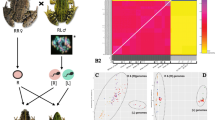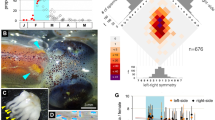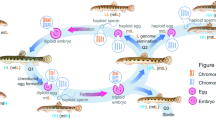Abstract
THE Amazon molly, Poecilia formosa (Girard), is an all-female species native to southern Texas and north-eastern Mexico1. In the northern part of the range, P. formosa is fertilized by males of P. latipinna; in the southern part by a species of the P. sphenops complex. Reproduction is usually by gynogenesis; no introgression of paternal characters into P. formosa stocks has been observed in any of the several laboratories in which they have been maintained during the past 36 yr1–7. With no genetic material being transferred from the male parent to the offspring, all P. formosa which have descended from a single progenitor should possess the same genotype and constitute a clone. The existence of several clones in natural populations has been demonstrated by tissue transplantation4,5. In rare instances some offspring of P. formosa females exhibit paternal characters and thus are hybrids6,8,9. In the Genetics Laboratory of the New York Aquarium where several clones of P. formosa have been maintained since 1960 by either mating them to males of P. vittata or P. sphenops (black molly stock), eighteen hybrids (about 1 per cent) have been obtained. Of these, three were sired by P. vittata and fifteen by P. sphenops.
This is a preview of subscription content, access via your institution
Access options
Subscribe to this journal
Receive 51 print issues and online access
$199.00 per year
only $3.90 per issue
Buy this article
- Purchase on Springer Link
- Instant access to full article PDF
Prices may be subject to local taxes which are calculated during checkout
Similar content being viewed by others
References
Hubbs, C. L., and Hubbs, L. C., Science, 76, 628 (1932).
Hubbs, C. L., and Hubbs, L. C., Genetics, 31, 218 (1946).
Hubbs, C. L., Systematic Zool., 4, 1 (1955).
Kallman, K. D., Evolution, 16, 497 (1962).
Darnell, R. M., Lamb, E., and Abramoff, P., Evolution, 21, 168 (1967).
Haskins, C. P., Haskins, E. F., and Hewitt, R. E., Evolution, 14, 473 (1960).
Hubbs, C., Bull. Texas Mem. Mus., 8, 1 (1964).
Kallman, K. D., Genetics, 50, 260 (1964).
Rash, E. M., Darnell, R. M., Kallman, K. D., and Abramoff, P., J. Exp. Zool., 160, 155 (1965).
Meyer, H. J., Genetics, 36, 22 (1938).
Wickbom, T., Hereditas, 29, 1 (1943).
Drewry, G. E., Bull. Texas Mem. Mus., No. 8, Appendix 1, 67 (1964).
McPhail, J. D., and Jones, R. L., J. Fish. Res. Board, Canada, 23, 767 (1966).
Schröder, J. H., Zool. Beiträge, 10, 369 (1964).
Beatty, R. A., Cam. Man. Exp. Biol., 7, 7 (1957).
MacGregor, H. C., and Uzzel, jun., J. M., Science, 143, 1043 (1964).
Sanderson, A. G. R., Proc. Roy. Soc. Edin., 67, 333 (1960).
Schultz, R. J., Science, 157, 1564 (1967).
Author information
Authors and Affiliations
Rights and permissions
About this article
Cite this article
SCHULTZ, R., KALLMAN, K. Triploid Hybrids between the All-female Teleost Poecilia formosa and Poecilia sphenops. Nature 219, 280–282 (1968). https://doi.org/10.1038/219280a0
Received:
Published:
Issue Date:
DOI: https://doi.org/10.1038/219280a0
This article is cited by
-
Influence of environmental parameters on growth pattern and population structure of Carassius auratus gibelio in Eastern Ukraine
Hydrobiologia (2011)
-
Analysis of a possible independent origin of triploid P. formosa outside of the Río Purificación river system
Frontiers in Zoology (2007)
-
The gynogenetic reproduction of diploid and triploid hybrid spined loaches (Cobitis: Teleostei), and their ability to establish successful clonal lineages—on the evolution of polyploidy in asexual vertebrates
Genetica (2007)
Comments
By submitting a comment you agree to abide by our Terms and Community Guidelines. If you find something abusive or that does not comply with our terms or guidelines please flag it as inappropriate.



